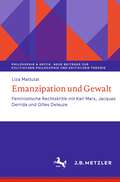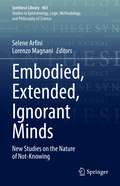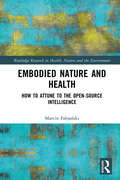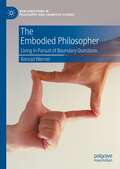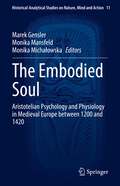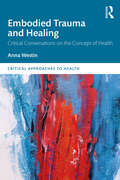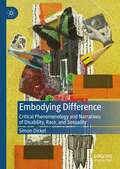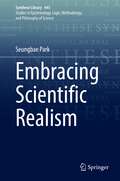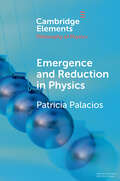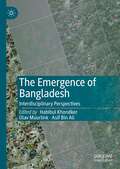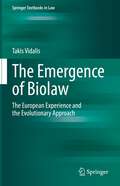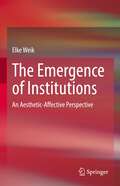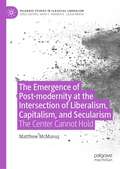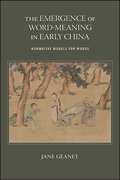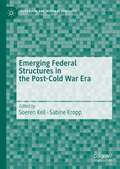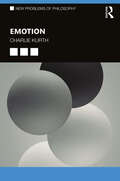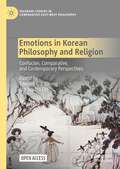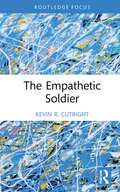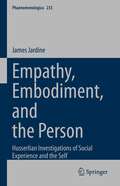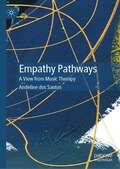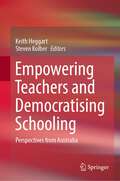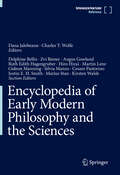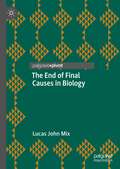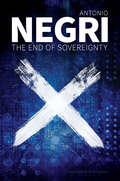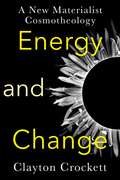- Table View
- List View
Emanzipation und Gewalt: Feministische Rechtskritik mit Karl Marx, Jacques Derrida und Gilles Deleuze (Philosophie & Kritik. Neue Beiträge zur politischen Philosophie und Kritischen Theorie)
by Liza MattutatSoziale Bewegungen stehen seit jeher in einem ambivalenten Verhältnis zum Recht. Einerseits versuchen sie oft, ihre Ansprüche als Rechte geltend zu machen, andererseits kritisieren sie die entpolitisierenden, gewaltsamen und repressiven Aspekte des Rechts. Liza Mattutat fragt deshalb, ob Rechtspolitiken möglich sind, die nicht nur die Inhalte des Rechts, sondern zugleich seine Form verändern. Dazu rekonstruiert sie die rechtskritischen Argumente von Karl Marx, Jacques Derrida und Gilles Deleuze und deutet mit ihnen zeitgenössische Auseinandersetzungen um die Ehe für alle, die Reform des Sexualstrafrechts und die Elternschaft von trans* Personen. Wo sind philosophische Rechtskritiken für die feministische Rechtspolitik einschlägig? Wo steht das bürgerliche Recht emanzipatorischen Bewegungen entgegen?
Embodied, Extended, Ignorant Minds: New Studies on the Nature of Not-Knowing (Synthese Library #463)
by Selene Arfini Lorenzo MagnaniThis book offers a new and externalist perspective in ignorance studies. Agnotology, the epistemology of ignorance, and, more generally, ignorance studies have grown to cover and explore different phenomena and subjects of research, from known events in history and sociology of science to the investigation of ordinary reasoning and cognitive processing. Nonetheless, although interested scholars have discussed ignorance phenomena and their impact on cognition, most of them have only adopted an internalist perspective to approach this theme. Meanwhile, even though externalist perspectives on cognition flourished in recent literature, authors have paid little attention to the emerging field of ignorance studies. Ignorance has been generally left out from the inquiries on the extension of cognitive states, cognitive processes, and predictive reasoning. Thus, in this volume, we seek to merge the two growing areas of research and to fill this research gap fruitfully. By addressing the uncomfortable themes that pertain to ignorance and related phenomena through an externalist perspective, this book aims to provide much food for thoughts to cognitive scientists and philosophers alike, enriching the current range and reach of both ignorance studies and externalist approaches to cognition.
Embodied Nature and Health: How to Attune to the Open-source Intelligence (Routledge Research in Health, Nature and the Environment)
by Marcin FabjańskiThis book describes how, as a species our survival and capacity to flourish depends on realizing the intimate relationship of humans with nature through active, embodied participation with nature. Living within the physicality of the planet is not a limitation, rather it is our liberation. Full realization of the consequences of this relationship, through embodied action, can liberate us from ego-dependence and transform us into a community of interdependent and flourishing beings. Embodied Nature and Health: How to Attune to the Open-source Intelligence describes a systems analysis of presence-centered cultivation of well-being through particular ways of being physically and mentally active in relation to nature that aims at helping the individual attune to natures’ rhythms. The systems analysis proposes the hypothesis of the Open-source Intelligence: an intelligence which originates from the placement of individual organisms in the tissue and the process of life. This framework draws upon and integrates contemporary research into the human–nature relationship and human well-being, and ancient philosophies that were developed prior to the Cartesian gap between the mind and the body, as well as using an auto-ethnographic approach dervied from the experience of the author. The proposed system highlights a practical approach to well-being, based on research into human attention and its effective usage in daily life. The book outlines a methodology that can be used in schools, as a basis of training in sports, as well as in the field of self-development, and highlights the necessity to develop a new, non-abusive relationship with the natural environment. This novel, multi-discipline, first-of-its-kind research book will be of strong interest to experts and academics in the fields of physical activity, education, ecology, and philosophy.
The Embodied Philosopher: Living in Pursuit of Boundary Questions (New Directions in Philosophy and Cognitive Science)
by Konrad WernerThe book is the first formulation of a meta-philosophical scheme rooted in the embodied cognition paradigm. The latter views subjects capable of cognition and experience as living, embodied creatures coupled with their environments. On the other hand, the emergence of experimental philosophy has given rise to a new context in which philosophers have begun to search for a more thorough definition of philosophical competence. The time is ripe for these two trends to join their efforts. Therefore, the book discusses what it means for a human being thought of as a living subject to pursue philosophy. In this context, in contrast to the existing literature, philosophical competence must not be conflated with competence in philosophy. The former is a skill or attitude. The book refers to this peculiar attitude as the recognition of one’s epistemic position.
The Embodied Soul: Aristotelian Psychology and Physiology in Medieval Europe between 1200 and 1420 (Historical-Analytical Studies on Nature, Mind and Action #11)
by Marek Gensler Monika Mansfeld Monika MichałowskaThis book contains a collection of papers devoted to the problems of body, mind and soul in medieval Europe between 1200 and 1420. Modern discussions of the mind-body relationship seldom look back into the past further than the psycho-somatic dualism of Descartes which started the mechanistic approach in biology and medicine. The authors of the volume go beyond that fault line to investigate the tradition of medieval natural philosophy and its ancient sources and analyze the issues forming a borderland between physiology and psychology. They also demonstrate that the medieval tradition was rich and diverse for it offered a wide variety of the discussed problems as well as the methodological approaches. This volume is the first attempt to cover a diversity of topics and methods employed in the medieval debates on body, mind and soul as well as their interrelationships. The Embodied Soul is a must-have for all those interested in puzzling dilemmas of how a living organism functions and how its inner life can be explained as well as for all those interested in the history of thought in general.Chapter 14 is available open access under a Creative Commons Attribution 4.0 International License via link.springer.com.
Embodied Trauma and Healing: Critical Conversations on the Concept of Health (Critical Approaches to Health)
by Anna WestinWhat if philosophy could solve the psychological puzzle of trauma? Embodied Trauma and Healing argues just that, suggesting that one might be needed in order to understand the other. The book demonstrates how the body-mind problem that haunted Descartes was addressed by phenomenologists, whilst also proposing that the human experience is lived subjectively as embodied consciousness. Throughout this book, the author suggests that the phenomenological tools that are used to explore the body can also be an effective way to discuss the physical and mental aspects of embodied trauma. Drawing on the work of Paul Ricœur, Maurice Merleau-Ponty and Emmanuel Lévinas, the book outlines a phenomenological approach to the embodied and relational subject. It offers a reading of embodied trauma that can connect it to wider conversations in psychological underpinnings of trauma through Peter Levine’s somatic research and Bessel van der Kolk’s embodied remembering. Connecting to the analytic tradition, the book suggests that phenomenology can unify both language-based and body-based therapeutic practice. It also presents a compelling discussion that ties the embodied experience of relation in trauma to the wider causal factors of social suffering and relational rupture, intergenerational trauma and the trauma of land, as informed by phenomenology. Embodied Trauma and Healing is essential reading for researchers within the fields of philosophy, psychology and medical humanities for it actively engages with contemporary configurations of trauma theory and recent research developments in healing and mental disorder diagnosis.
Embodying Difference: Critical Phenomenology and Narratives of Disability, Race, and Sexuality
by Simon DickelThis book explores how phenomenological ideas about embodiment, perception, and lived experience are discussed within disability studies, critical race theory, and queer studies. Building on these disciplines, it offers readings of memoirs and novels that address the consequences of stigmatization and the bodily dimensions of social differences. The texts include Robert F. Murphy’s The Body Silent, Simi Linton’s My Body Politic, Rod Michalko’s The Two-in-One: Walking with Smokie, Walking with Blindness, three memoirs by Stephen Kuusisto, Vincent O. Carter’s The Bern Book, as well as two novels, Matthew Griffin’s Hide and Armistead Maupin’s Maybe the Moon. All of the texts discussed in this book negotiate the significance of bodily and perceptual habits, the influence of language and culture on embodiment, the importance of relationality and community, the severe effects of misrecognition, and the possibilities of emancipation and social recognition. Hence, they are read as pioneering contributions to the emerging field of critical phenomenology.
Embracing Scientific Realism (Synthese Library #445)
by Seungbae ParkThis book provides philosophers of science with new theoretical resources for making their own contributions to the scientific realism debate. Readers will encounter old and new arguments for and against scientific realism. They will also be given useful tips for how to provide influential formulations of scientific realism and antirealism. Finally, they will see how scientific realism relates to scientific progress, scientific understanding, mathematical realism, and scientific practice.
Emergence and Reduction in Physics (Elements in the Philosophy of Physics)
by Patricia PalaciosThis Element offers an overview of some of the most important debates in philosophy and physics around the topics of emergence and reduction and proposes a compatibilist view of emergence and reduction. In particular, it suggests that specific notions of emergence, which the author calls 'few-many emergence' and 'coarse-grained emergence', are compatible with 'intertheoretic reduction'. Some further issues that will be addressed concern the comparison between parts-whole emergence and few-many emergence, the emergence of effective (-field) theories, the use of infinite limits, the notion of intertheoretic reduction and the explanation of universal and cooperative behavior. Although the focus will be principally on classical phase transitions and other examples from condensed matter physics, the main aim is to draw some general conclusions on the topics of emergence and reduction that can help us understand a variety of case-studies ranging from high-energy physics to astrophysics.
The Emergence of Bangladesh: Interdisciplinary Perspectives
by Habibul Khondker Olav Muurlink Asif Bin AliThe Emergence of Bangladesh analyses and celebrates the first 50 years of Bangladesh as a nation, bringing insights from key scholars in Bangladeshi studies to an international audience, as well as ‘bringing home’ to a domestic audience the work of some of the nation’s greatest intellectual exports, the Bangladeshi scholars who have made a mark in their field of study in academia. The book offers unique coverage of the battlegrounds on which the founding of the new nation was fought, including language, power and religion, and provides unique insight into some of the hot spots that continue to shape the development of the nation: the issues of gender, culture, ethnicity, governance, the economy and the army. Those with an interest in understanding the past or present Bangladesh will find this a trove of frank and readable analysis.
The Emergence of Biolaw: The European Experience and the Evolutionary Approach (Springer Textbooks in Law)
by Takis VidalisThis book introduces “biolaw” as an integrated and distinct field in contemporary legal studies. Corresponding to the legal dimension of bioethics, the term “biolaw” is already in use in academic and research activities to denote legal issues emerging mostly from advanced technological applications. This book is a genuine attempt to rationalize the field of biolaw after almost four decades of continuous production of relevant legislation and judgments worldwide. This experience is a robust basis for defending a) a separate legal object, covering the total of legal norms that govern the management of life as a natural phenomenon in all its possible forms, and b) an “evolutionary” approach that opens the discussion on a future conciliation of legal regulation with the Theory of Evolution on the ground of biolaw.
The Emergence of Institutions: An Aesthetic-Affective Perspective
by Elke WeikThis book presents an experiential, aesthetic-affective approach to the study of institutions. Drawing on institutional sociology, hermeneutics, phenomenology and process philosophy, it conceptualises institutions as collective experiences with their own self-promoting and self-propelling powers. Instead of seeing institutional emergence, change and decline as the result of actors’ interests and manipulations, this book re-establishes the importance of factors beyond human design and intervention. Drawing on process theory, it shows how ideas, norms and values can form self-stabilising configurations that affect people without conscious realisation. It complements current thinking about institutions by showing how institutions constitute people long before people constitute them. With the help of authors as diverse as Antonio Damasio, A.N. Whitehead, J.W. von Goethe and Max Weber, Elke Weik crafts a perspective that allows us to understand institutions as aesthetic and affective powers in their own right. This book is for researchers interested in process theory, institutional and organisational studies, hermeneutics, and aesthetics.
The Emergence of Post-modernity at the Intersection of Liberalism, Capitalism, and Secularism: The Center Cannot Hold (Palgrave Studies in Classical Liberalism)
by Matthew McManusThis book is a systematic and thorough analysis of what post-modernity is and how it emerged. It distinguishes between those who regard post-modernity as a theoretical approach and those who regard it as a culture, and argues that interpreting post-modernity as a culture is more fruitful. It discusses the three factors which led to its emergence, namely liberalism, capitalism, and secularism, highlighting their respective influence in generating the culture of post-modernity within neoliberal societies. The volume provides a lengthy analysis of neoliberal post-modernity in practice, arguing that post-modernism is the cultural condition of neoliberal societies in the late 20th and early 21st centuries. Until recently it seemed that neoliberal post-modernity was here to stay, framed by relationship to freedom and time which stressed individual agency but precluded the possibility of historical change at the political level. However, the Great Recession of 2008 opened new spaces for agitation and transformation which has resulted in the discordant politics of the last decade. This book will be of interest to scholars working in a number of fields, including economic policy, cultural analysis, political theory, and social critique.
The Emergence of Word-Meaning in Early China: Normative Models for Words (SUNY series in Chinese Philosophy and Culture)
by Jane GeaneyThe Emergence of Word-Meaning in Early China makes an innovative contribution to studies of language by historicizing the Chinese notion that words have "meaning" (content independent of instances of use). Rather than presuming that the concept of word-meaning had always existed, Jane Geaney explains how and why it arose in China. To account for why a normative term (yi, "duty, morality, appropriateness") came to be used for "meanings" found in dictionaries, Geaney examines interrelated patterns of word usage threading through and across a wide range of genres. These patterns show that by the first millennium, as textual production exploded—and as radically different writing forms (in Buddhist sutras) were encountered—yi already functioned as an externally accessible "model" for semantic interpretation of texts and sayings.The book has far-reaching implications. Because the idea of word-meaning is fundamental to theorizing, the book illuminates not only semantic ideas and the normativity of language in Early China, but also aspects of early Chinese philosophy and intellectual history. As the internet supplants one form of media (print), thereby reducing knowledge to vast digital databases, so too, this book explains, two thousand years ago a culture that prized oral and visual balance became an "empire of the text."
Emerging Federal Structures in the Post-Cold War Era (Federalism and Internal Conflicts)
by Soeren Keil Sabine KroppThis book conceives federalism not as a static institutional architecture, but as a dynamic formation always in flux. This may entail processes of federalization, but in some cases also lead to de-federalization. It looks at emerging federal structures worldwide and analyses federal structures: their emergence, operation and categorization. The contributors highlight that the “emergence” of these federal structures has multiple facets, from the recognition of ethnic diversity to the use of federalism as a tool of conflict resolution. Identifying and categorizing processes of federalization and defederalization in a variety of cases, the book provides much needed empirical and theoretical discussion on emerging federal structures and the changing nature of federalism in the post-Cold War era.
Emotion (New Problems of Philosophy)
by Charlie KurthEmotions have long been of interest to philosophers and have deep historical roots going back to the Ancients. They have also become one of the most exciting areas of current research in philosophy, the cognitive sciences, and beyond. In this book, Charlie Kurth explains the philosophy of the emotions, structuring the book around seven fundamental questions: What are emotions? Are emotions natural kinds? Do animals have emotions? Are emotions epistemically valuable? Are emotions the foundation for value and morality? Are emotions the basis for responsibility? Do emotions make us better people? In the course of exploring these questions, he also discusses cutting-edge empirical research on emotion, feminist approaches to emotions and their value, and methodological questions on how to theorize about the emotions. The book also contains in-depth discussions of specific emotions like compassion, disgust, anxiety, and curiosity. It also highlights emerging trends in emotion research. Including suggestions for further reading and a glossary of key terms, Emotion is ideal for those studying and researching the philosophy of emotion as well as ethics, epistemology, and the philosophies of mind and psychology.
Emotions in Korean Philosophy and Religion: Confucian, Comparative, and Contemporary Perspectives (Palgrave Studies in Comparative East-West Philosophy)
by Edward Y. J. Chung Jea Sophia OhThis pioneering book presents thirteen articles on the fascinating topic of emotions (jeong 情) in Korean philosophy and religion. Its introductory chapter comprehensively provides a textual, philosophical, ethical, and religious background on this topic in terms of emotions West and East, emotions in the Chinese and Buddhist traditions, and Korean perspectives. Chapters 2 to 5 of part I discuss key Korean Confucian thinkers, debates, and ideas. Chapters 6 to 8 of part II offer comparative thoughts from Confucian moral, political, and social angles. Chapters 9 to 12 of part III deal with contemporary Buddhist and eco-feminist perspectives. The concluding chapter discusses ground-breaking insights into the diversity, dynamics, and distinctiveness of Korean emotions.This is an open access book.
The Empathetic Soldier (War, Conflict and Ethics)
by Kevin R. CutrightThis book shows the contribution that empathy can and should make to the proper conduct of war. US Army doctrine identifies empathy as an essential trait in soldiers; despite this endorsement of senior leaders, empathy’s role in the military profession remains obscure. The notion of soldiers empathetically considering others, especially enemies, strikes many as counter to the nature of soldiering. Additionally, confusion caused by differing definitions of empathy often leads to its complete dismissal. This work clarifies the concept by considering recent philosophical, psychological, and neuroscientific research, and demonstrates the relevance of empathy to the tactical and strategic demands of war. Empathy amplifies soldiers’ understanding of human actors in an operational environment, enables soldiers’ critical and creative thinking, and improves their overall intentions, planning, and assessments of a war’s progress. While empathy can make soldiers more susceptible to the psychic wound of moral injury, it also helps prevent and overcome this injury. Instead of dismissing it, soldiers should assimilate empathy into their moral frameworks. This book will be of much interest to students of the ethics of war, psychology, and military studies generally.
Empathy, Embodiment, and the Person: Husserlian Investigations of Social Experience and the Self (Phaenomenologica #233)
by James JardineThis text explores how self-consciousness and self-understanding differ phenomenologically from the experience and comprehension of others, and the extent to which such relations are constitutively interdependent.Jardine argues that Husserl’s analyses of selfhood and intersubjectivity are animated by the question of what's at stake in recognising an agent’s engagement as the situated response of a person, rather than simply as the comportment of an animal or living body. Drawing centrally from the freshly excavated Ideas II drafts and manuscripts, the author develops Husserl’s often fragmentary investigations of attention, habit, emotion, freedom, the common world, and action, and considers their implications for subjectivity and the experience of others. Empathy, Embodiment, and the Person also brings Husserlian phenomenology into dialogue with twenty-first century philosophical concerns, from accounts of selfhood and agency from analytic philosophy to the treatment of social experience in critical theory.The book shows the reader that transcendental phenomenology can be rejuvenated by engaging with a broader philosophical landscape and will appeal to researchers, students, and instructors in the field.
Empathy Pathways: A View from Music Therapy
by Andeline dos SantosMany descriptions of empathy revolve around sharing in and understanding another person’s emotions. One separate person gains access to the emotional world of another. An entire worldview holds up this idea. It is individualistic and affirms the possibility of access to other people’s “inner world.” Can we really see inside another, though? And are we discrete, separate selves? How can we best grapple with these questions in the field of music therapy? In response, this book offers four empathy pathways. Two are situated in a constituent approach (that prioritises discrete individuals who then enter into relationships with one another) and two are located in relational approaches (that acknowledge the foundational reality of relationships themselves). By understanding empathy more fully, music therapists, teachers and researchers can engage in ways that are congruent with diverse worldviews and ways of being. Examples used in the book are from active and receptive music therapy approaches as well as from community and clinical contexts, so as to provide clear links to practice. This book will be a valuable resource for academics and postgraduate students within music therapy and allied fields including art therapy, drama therapy, dance/movement therapy, psychology, counselling, occupational therapy and social development studies.
Empowering Teachers and Democratising Schooling: Perspectives from Australia
by Keith Heggart Steven KolberThis edited book brings together teachers and education academics who are committed to education about, for and through democracy. It presents a diverse range of viewpoints about the challenges facing educators working across different sectors and discusses ways to challenge issues like neoliberalism, excessive managerialism and accountability and privatisation. It also engages with the times that education has, and continues, to fail students. This book outlines both logistical and ideological challenges which educators committed to democracy face and describes innovative approaches they have adopted, including networking, the use of social media and digital tools and extending their reach beyond their local communities to international audiences. It encourages conversations about how educators and academics might re-commit to education for democracy and generate further avenues for discussion and action by educators and academics.
Encyclopedia of Early Modern Philosophy and the Sciences
by Delphine Bellis Zvi Biener Justin E. Smith Angus Gowland Ruth Hagengruber Hiro Hirai Martin Lenz Gideon Manning Silvia Manzo Cesare Pastorino Marius Stan Kirsten WalshThis Encyclopedia offers a fresh, integrated and creative perspective on the formation and foundations of philosophy and science in European modernity. Combining careful contextual reconstruction with arguments from traditional philosophy, the book examines methodological dimensions, breaks down traditional oppositions such as rationalism vs. empiricism, calls attention to gender issues, to ‘insiders and outsiders’, minor figures in philosophy, and underground movements, among many other topics. In addition, and in line with important recent transformations in the fields of history of science and early modern philosophy, the volume recognizes the specificity and significance of early modern science and discusses important developments including issues of historiography (such as historical epistemology), the interplay between the material culture and modes of knowledge, expert knowledge and craft knowledge. This book stands at the crossroads of different disciplines and combines their approaches – particularly the history of science, the history of philosophy, contemporary philosophy of science, and intellectual and cultural history. It brings together over 100 philosophers, historians of science, historians of mathematics, and medicine offering a comprehensive view of early modern philosophy and the sciences. It combines and discusses recent results from two very active fields: early modern philosophy and the history of (early modern) science. Editorial BoardEDITORS-IN-CHIEFDana Jalobeanu University of Bucharest, RomaniaCharles T. Wolfe Ghent University, BelgiumASSOCIATE EDITORSDelphine Bellis University Nijmegen, The NetherlandsZvi Biener University of Cincinnati, OH, USAAngus Gowland University College London, UKRuth Hagengruber University of Paderborn, GermanyHiro Hirai Radboud University Nijmegen, The NetherlandsMartin Lenz University of Groningen, The NetherlandsGideon Manning CalTech, Pasadena, CA, USASilvia Manzo University of La Plata, ArgentinaEnrico Pasini University of Turin, ItalyCesare Pastorino TU Berlin, GermanyLucian Petrescu Université Libre de Bruxelles, BelgiumJustin E. H. Smith University de Paris Diderot, FranceMarius Stan Boston College, Chestnut Hill, MA, USAKoen Vermeir CNRS-SPHERE + Université de Paris, FranceKirsten Walsh University of Calgary, Alberta, Canada
The End of Final Causes in Biology
by Lucas John MixThis book provides a straightforward introduction to teleology in biology, the work it did and the work it can do. Informed by history and philosophy, it focuses on scientific concerns. Seventeenth, eighteenth, and nineteenth century biologists proposed a menagerie of biological “actors” to explain power without appealing to Aristotelian vegetable souls and final causes. Three constraints on teleology narrowed the field, selecting among the various actors as they mutated and recombined. Methodological naturalism, local adaptation, and blind chance each represent a significant philosophical advance in biology. Kant, Darwin, and the Modern Synthesis provided a new teleology, grounded in natural selection, an etiological recursion of form and function, and the details of carbon chemistry on Earth. They naturalized teleology, but they also finalized nature, shifting conceptions about the world and science. Understanding these links – historical, philosophical, and theoretical – sets the stage for new work moving forward.
The End of Sovereignty
by Antonio NegriThis book brings together Antonio Negri&’s critical writings on the nature and form of the modern state. The central theme that runs through these writings is our need to be done with the sovereign state – that is, with the particular form of political power that the capitalist organization of bourgeois society has imposed upon us. Negri seeks to show how the sovereign bourgeois state built in the course of modernity has now become a weapon in the hands of a declining ruling class, a class sometimes exhausted in its institutional expressions and sometimes frenetic, zombie-like and parafascist. In arguing that the despotic power of the state should be abolished, Negri distances himself from some other left-wing thinkers who, erroneously in his view, have come to see the state as an unavoidable institution rather than as a place of power that, once conquered, should be transformed and ultimately dissolved, since it represents the central moment in the organization of force against living labour and free citizenship. In Negri&’s view, the call for the abolition of the state remains vital and active today, as a concrete utopia that is expressed in every thought and act of liberation. The articles brought together in this volume range from Negri&’s analysis of the first great transformation of the capitalist state in the twentieth century, a phenomenon precipitated by the triumph of Keynesianism, to his more recent work on how the form of sovereignty changed from being a figure of transcendent and local command to being a dispositif of immanent and global control. Like its companion volumes, this new collection of essays by Negri will be a valuable resource for anyone interested in radical politics and in the key social and political struggles of our time.
Energy and Change: A New Materialist Cosmotheology (Insurrections: Critical Studies in Religion, Politics, and Culture)
by Clayton CrockettAs humanity continues to consume planetary resources at an unsustainable rate, we require not only new and renewable forms of energy but also new ways of understanding energy itself. Clayton Crockett offers an innovative philosophy of energy that cuts across a number of leading-edge disciplines. Drawing from contemporary philosophies of New Materialism, non-Western traditions, and the sciences, he develops a comprehensive vision of energy as a material process spanning physics, biology, politics, ecology, and religion.Crockett argues that change is foundational to material reality, which is ceaselessly self-organizing. We can observe energy’s effects in the operations of natural selection as well as those at work in human societies. Matter and energy are not an oppositional binary; rather, they are expressions of how change functions in the universe. Ultimately, Crockett argues, we can conceive of God neither as a deity nor as a being but as the principle of change.Informed by cutting-edge theoretical discourses in thermodynamics, science studies, energy humanities, systems theory, continental philosophy, and radical theology, Energy and Change draws on theorists such as Gilles Deleuze, Catherine Malabou, Slavoj Žižek, Karen Barad, Bruno Latour, and Kojin Karatani as well as ideas about spirituality, society, and nature from Amerindian, Vodou, and Neo-Confucian traditions. A foundational work in New Materialist philosophy of religion, this book offers compelling new insights into the structure of the cosmos and our place in it.
